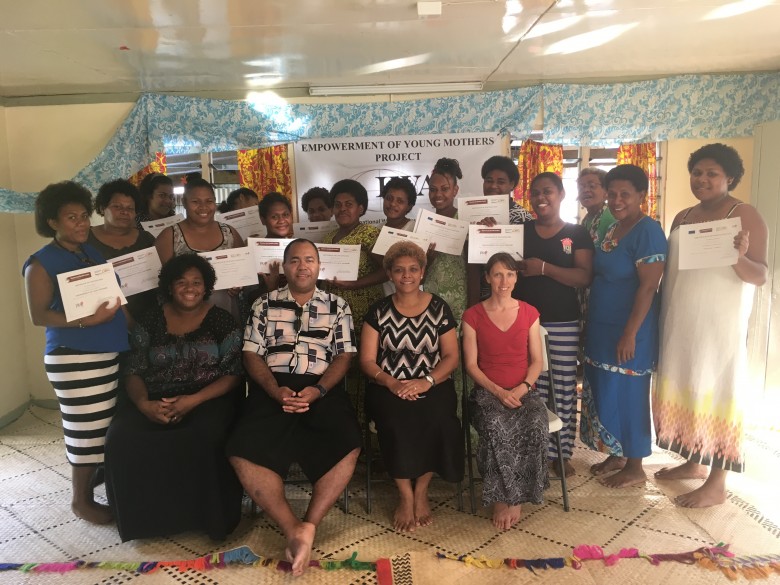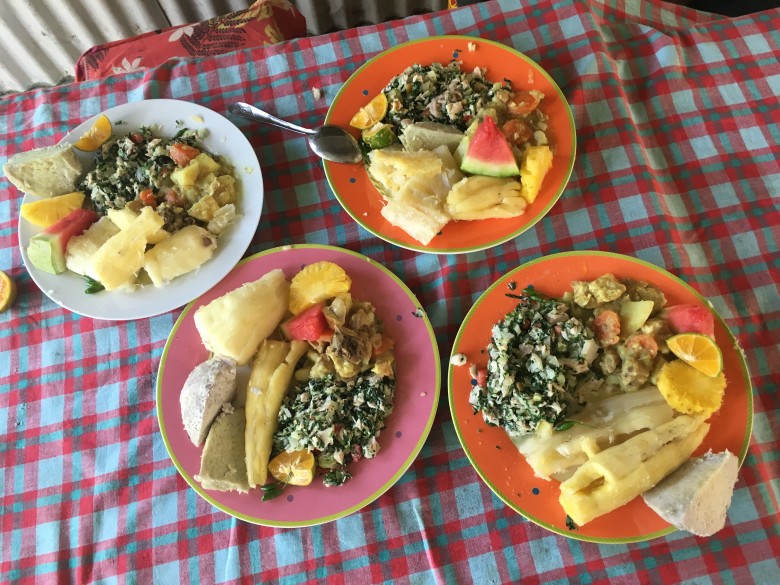Young Mothers Project – Nadi Series – Part 3 (August 10th 2017)
VSHC/CCOHSI Facilitators:
Coordinator:
-
Lauren Toll (Community Health Promotion Officer/AVI volunteer)
Facilitators:
-
Mosese Baseisei (Project Manager)
-
Seremaia Koroi (Health Promotion Officer)
-
Lauren Deakin (Public Health Communications Mentor/AVI volunteer)
-
Amelia Ake (Project Nurse)
Venue
Koroivolu Methodist Church Hall, Nadi
Presenting Stakeholders
-
Karunagaran Nair (Ministry of Youth and Sports)
-
Suneel Kumar (Department of Cooperative)
-
Ranjeeta Chand & Rachna Ronjini (National Employment Centre)
-
Cecilia Torosi (Births, Deaths and Marriages)
Aims and Objectives
The aim of the third and final workshop is to provide the mothers with financial literacy training to enhance their independence and competence with finances and savings, as well as develop key skills and knowledge on how to begin a small business. The program also followed up on previous workshops, whereby mothers were provided an opportunity to register with National Employment Centre (NEC), partake in women’s health screenings, and discuss group registrations with assistance from Ministry of Youth and Sports.
Attendees
Young mothers: 13
Community Health Workers: 3
Order of Events
The workshop was held at Koroivolu Methodist Church Hall in Nadi, commencing at 8.30 am.
Opening prayers were conducted by Vinaisi Nadruku (Yavuna CHW), before a welcome and introduction from Mosese Baseisei (VSHC).
Session 1: Karunagaran Nair (Ministry of Youth and Sports)
Karunagaran delivered a condensed version of the 5-day ‘Seeds of Success’ training which is based on the idea of ‘planting today for a beautiful life tomorrow’ by focusing on positive thoughts, good character, awareness of purpose, and habits that support your goals. These ‘seeds’ must then be nourished with kindness, gratitude, attention and actions. The twelve seeds covered in the training included:
1. Know who you are
Karunagaran asked the mothers to answer the question ‘who am I?’ Individuals in the group mostly described themselves as a mother, single or married, and loving and caring. Karunagaran explained how we become stronger when we are balanced spiritually (through prayer), mentally (positive thinking) economically (earning enough money to support yourself), socially (social connections with others) and physically (keep healthy). He also encouraged the group to build on their strengths.
2. What is our purpose in life?
Knowing our purpose is important as it helps us to focus on our goals. Many of the participants answered their purpose is to be a good mother, or to be successful in life.
3. Create your life
This seed explains how we are the creator of our own life and reach our goals if we work towards them. What we think, we become; through thoughts, words and actions. The idea of SMART goals (Specific, Measurable, Achievable, Realistic and Time based) was also discussed.
4. Be of good character
Traits found in those of good character, as responded by the mothers, included honesty, kindness, loving, hardworking and humble. Karunagaran also added empathy to this list, and encouraged mothers to think about just one thing they can do to improve themselves, as an easy first step.
5. Choose positive thoughts and words
‘We are what we think and say’ was the focus of this seed. Karunagaran listed ways to help with positive thinking as, read good books, watch good movies, change negative thoughts to positive ones, being grateful, kind to others, and enthusiastic.
6. Take action
Choose a one, three and five year plan for your goals, and achieve them through right association, decision making, and use of resources.
7. Be disciplined
Participants were encouraged to create good habits and actions that help them live their purpose or reach their goals, such as doing what is most important and keeping focused.
8. Go the extra mile
Pursuing excellence and developing your own skills and abilities are a cornerstone of achieving your goals.
9. Learn from everything
Karunagaran explained how any failure or heartache has a lesson, which can be learnt if we take one step at a time, slowly and consistently. He used the Fijian saying “Life is like this, sometimes sun, sometimes rain” to demonstrate the commonality that we all have problems at times, but life goes on.
10. Be part of your community
Family, friends and community provide the foundation for an individual’s life, and everyone should strive to make a difference as any small act can help others.
11. Use time and money wisely
The young mothers were encouraged to make time for their goals a priority, and to say no to other requests if they start making life busy and unbalanced. It was also emphasised that money must be saved before being spent.
12. Live your faith
Karunagaran finished with the notion that despite our individual faiths, most share the same values of peace, respecting yourself, respecting others, and respecting everything (such as animals and the earth), which are all ideals that can make us better people and therefore a better world – ‘be the change you want to see in the world’.
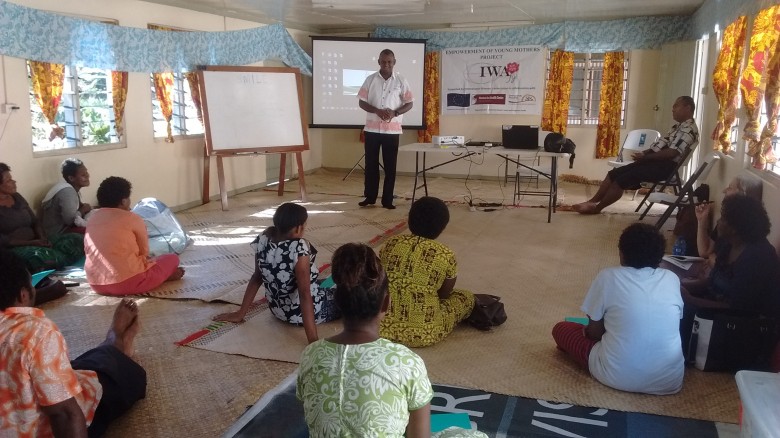
Karunagaran Nair from Ministry of Youth delivering ‘Seeds of Success’ training to young mothers at the third workshop, Nadi (August 2017).
Session 2: Suneel Kumar (Department of Cooperative)
Suneel began the presentation with the important topic of budgeting. He advised participants to know where their money comes from, where it goes, and where they can save. This can be achieved through having a spending diary, cutting down on household bills (eg. using less electricity), and paying off all debts first to avoid interest charges. It is also important to not spend more than you save, set a savings goal, involve your family, and keep an emergency savings account for ‘just in case’.
Suneel then summarised the two main ways of earning money: working for someone (employment), or working for yourself (owning a business). Several mothers indicated plans to begin their own small business, which Suneel explained the process of business registration including documents needed to register, licences to obtain and costs involved (Health license, Fire approval, OHS compliance, DO council approval, FNPF clearance):
Suneel encouraged the mothers to record everything, as FIRCA requires financial reports at the end of every financial year, and explained how the biggest threats to business are credit (dinau/kerekere). He advised to avoid credit sales as these are not always repaid, leaving the business owner short of funds. MITT loans are available for individuals with micro/small businesses (up to $1000), or IHRDP grants for groups mostly involving poultry, beekeeping, bakery or fishing (up to $100,000).
The role of Department of Cooperative was also explained. This department can assist with business plans, as well as setting up a cooperative, which was detailed as:
-
A legal business entity that is democratically controlled and free from religion or politics
-
Ten or more people are required for the cooperative to be registered (these people must be the owners). Types include consumers, teachers unions, hotels, land purchases, and taxis
-
Tax exempt for first eight years but still need to lodge tax returns, however profit of over $30,000 is considered taxable
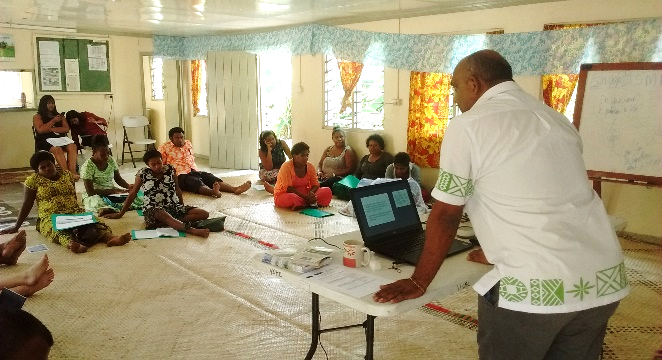
Suneel Kumar discussing the Department of Cooperative.
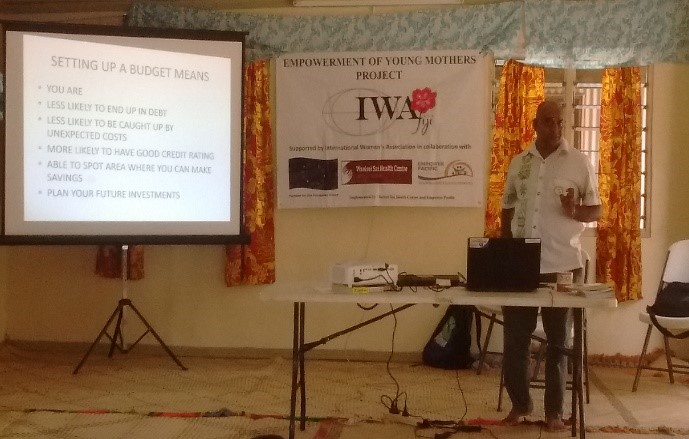
Suneel Kumar discussing budgeting.
Session 3: National Employment Centre registration, Women’s Health Screenings and Scouts registration
The hour before lunch allowed mothers to rotate between several activities.
Ranjeeta Chand and Rachna Ronjini from NEC were present to register mothers as a follow up from the NEC presentation in the second workshop. Mothers were required to have a passport photo, TIN letter and birth certificate for this process. A total of four mothers registered during the session, with others showing interest to do so at a later stage once obtaining the required documents.
Women’s health screenings were available throughout the day with CCOHSI nurse Amelia Ake in the VSHC bus. Only three mothers had Pap smears, however this was due to many of them being up to date with their screenings.
Karunagaran Nair again assisted the mothers with registering for Scouts, and raised the notion of a five day Tourism Training Course that Ministry of Youth can provide free of charge to the mothers, with collaboration from VSHC. This will be followed up to assess viability.
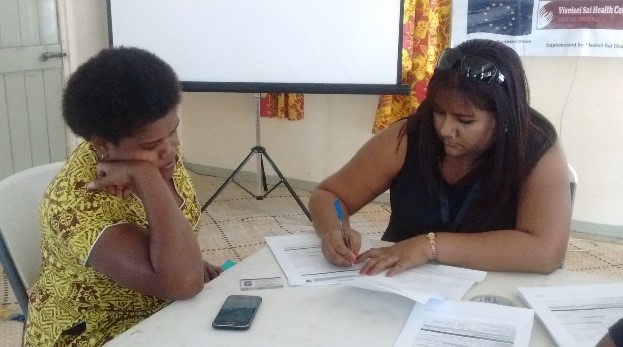
Rachna Ronjini registering a mother with NEC.
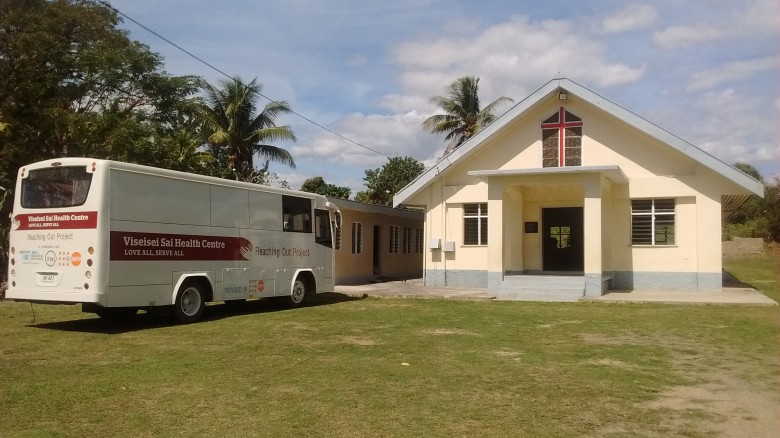
VSHC bus provided women’s health screenings at the third workshop in Nadi (August, 2017).
Session 4: Cecilia Torosi (Births, Deaths and Marriages)
Cecilia gave an informative presentation to the mothers on the importance, process, and cost of registering any births, deaths or marriages with the office.
Birth Certificates
Birth certificates are essential and the responsibility of the parents. Registration should occur within one year of birth (cost $2.20), after which the fee increases to $10.90, or $21 if the hospital notification is lost. Hospital notifications dictate what is written on the birth certificate, so it is critical to ensure all details are correct. When registering their child, parents need to bring their own birth certificate, marriage certificate and VKB details (which provides identity to land/tribe). The child is registered with the father’s side, except in the case of single mothers where the child is registered with the mother’s VKB.
Marriage Certificates
The legal age to marry is now 18 years. To obtain a marriage certificate you must bring a birth certificate, ID and passport photo. Those wishing to change their name must do so by deed poll and pay $7.65. To obtain a legal divorce you must be separated for at least one year. Ensure you are legally divorced before remarrying or this could be classed as bigamy which becomes a police matter.
Death Certificates
The fee to register a death is $2.20. Whoever comes to register the death must be a spouse or next of kin, and number of children, burial date and place, and date of death must all be known.
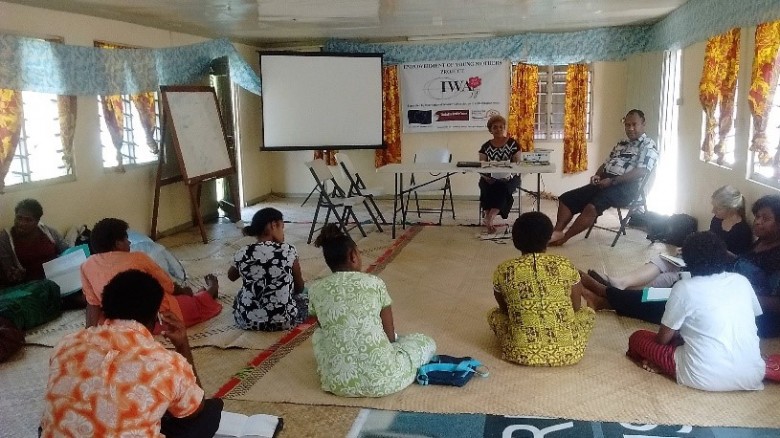
Cecilia Torosi presenting on Births, Deaths and Marriages.
Session 5: Certificates and close of program
Cecilia Torosi presented all mothers with a Certificate of Participation, with six mothers being awarded a certificate for their attendance at all three workshops. The group were thanked for their involvement in the project and encouraged to act on their new knowledge and skills, and make the most of the opportunities they have been presented with.
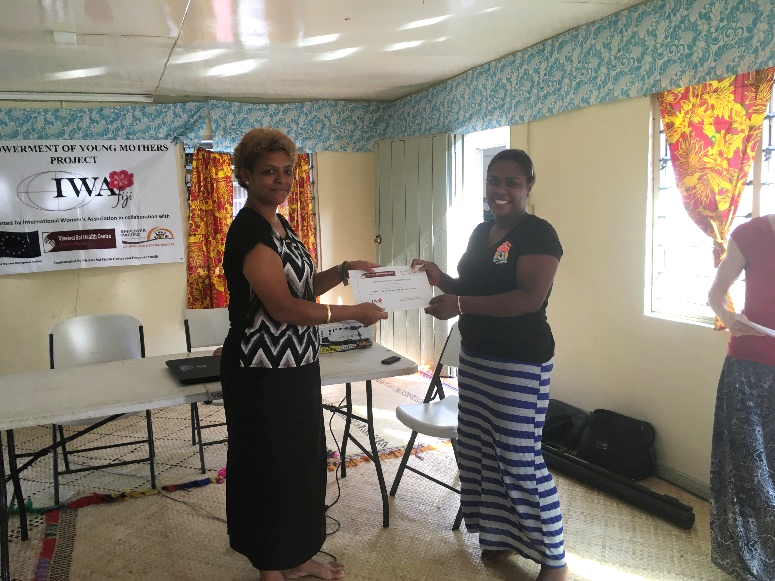
Cecilia Torosi presenting certificate to workshop participants.
Participants holding their workshop certificates from Phase 1, 2 and 3 of the Nadi Series Young Mothers Project.
Evaluation
The workshop received very positive feedback from the participants, with Department of Cooperative and ‘Seeds of Success’ training viewed as the most useful presentations. The majority of mothers reported increased self-esteem and empowerment as a result of attending.
Healthy Lunch.
